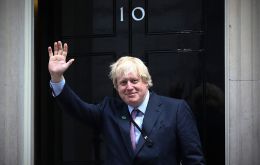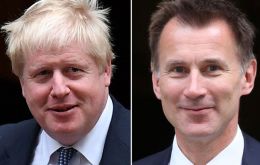MercoPress. South Atlantic News Agency
Tag: Gwynne Dyer
-
Monday, August 16th 2021 - 06:45 UTC
Afghanistan: Western armies always lose guerilla wars in the “Third World,” but it never really matters.

By Gwynne Dyer - “I will never kneel before such a destructive force (as the Taliban),” declared Ashraf Ghani, the ex-president of Afghanistan before fleeing. “We will either sit knee-to-knee for real negotiations at the table or break their knees on the battlefield.” Good luck with that, Ashraf.
-
Saturday, January 9th 2021 - 23:15 UTC
UK leaves EU: 48% of turkeys did not vote for Christmas

By Gwynne Dyer - Blaming the victims is never a good look. As Britain finally leaves the European Union, 1,651 days after the Brexit referendum of 2016, we should try to remember that 48% of the turkeys didn't vote for Christmas.
-
Friday, January 3rd 2020 - 09:19 UTC
Boris Johnson and English nationalism victory in the Brexit election: death knell for UK?

By Gwynne Dyer – Down on the turkey farm, the Scottish and Irish birds noticed the smiling man was holding a hatchet behind his back and hid. The Welsh turkeys looked confused and huddled together squawking. But the English turkeys marched bravely up to the chopping block, confident this would be a Christmas to remember.
-
Thursday, November 14th 2019 - 18:30 UTC
As populism advances, beware of the Polish secret

By Gwynne Dyer – There is a tension at the heart of populist political parties that may ultimately lead most of them to electoral defeat. They depend heavily on the votes of the old, the poor and the poorly educated — “I love the poorly educated,” as Donald Trump once put it — but they are also right-wing parties that do not like what they call “socialism.” (Other people call it the welfare state.)
-
Thursday, July 25th 2019 - 08:09 UTC
Boris, the last Prime Minister of the United Kingdom?

By Gwynne Dyer - It has been suggested that Boris Johnson (who becomes the prime minister of the United Kingdom, UK) is what you would get if Donald Trump had been educated at Eton and Oxford. Maybe, although there is a great gulf between Trump’s bombastic self-promotion and Johnson’s self-deprecating, rather shambolic persona.
-
Saturday, July 6th 2019 - 12:50 UTC
Brexit and Conservative nationalism: fantasy collides with reality next October

By Gwynne Dyer - Oscar Wilde described fox-hunting as “the unspeakable in pursuit of the inedible.” Brexit may be similarly defined as the unhinged in pursuit of the infeasible.
-
Thursday, May 9th 2019 - 06:52 UTC
What could dilute the EU, populism or the lack of a unifying external threat?

By Gwynne Dyer - For the second time in a month, a member country of the European Union has NOT voted a populist into power. Could it be that the populist wave has broken?
-
Tuesday, February 5th 2019 - 09:07 UTC
European allies bend to join 'gringo empire' approach

The decision to promote Juan Guaidó as a rival president to Nicolás Maduro in Venezuela was clearly made in Washington, not in Caracas. The speed with which U.S. allies in the Americas and western Europe recognised Guaidó’s claim on Jan. 23 to be the legitimate president of Venezuela would not have been possible without a lot of prior coordination — and a lot of pressure by the Trump administration.
-
Thursday, December 6th 2018 - 09:28 UTC
Populism is not an ideology, it's a political technique which thrives on angry people

Five of the world’s largest democracies now have populist governments, claimed The Guardian last week, and proceeded to name four: the United States, India, Brazil and the Philippines. Which is the fifth? At various points it name-checks Turkey, Italy and the United Kingdom, but it never becomes clear which. (And by the way, India’s prime minister Narendra Modi is not a populist. He’s just a nationalist.)
-
Monday, November 19th 2018 - 08:49 UTC
Automation, rust belts, and the angry and unhappy US electorate

Barack Obama said of the U.S. mid-term elections that “the character of our country is on the ballot,” and the outcome proved him right. The United States is a psychological basket case, more deeply and angrily divided than at any time since the Vietnam War.
